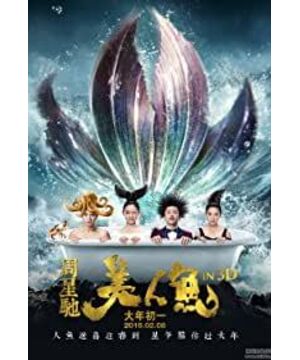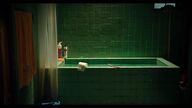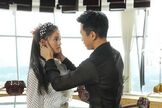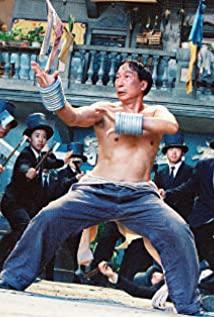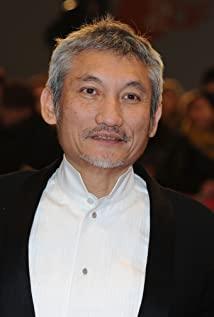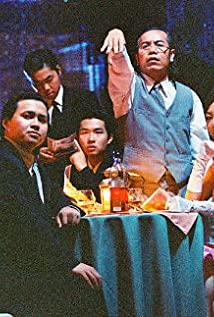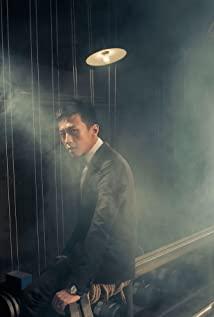From Exit A3 of Wanchai MTR Station, it takes less than five minutes to walk, and Ship Street is facing the brightly lit Southorn Stadium. This street is connected to the main road, Johnston Road and Queen's Road. It is no more than 200 meters long, and it is straight and short. Walking here, every bit of land under your feet was obtained by reclamation in 1887. In the 1910s, Johnston Road, which runs east to west, was still a wharf, and ships would stop at Ship Street for repairs and maintenance, hence the name of the street.
Today, it is one of the most modern restaurants in Hong Kong. Creative water-cooking restaurants have opened all over Ship Street. The Italian pizzeria owner will greet you in salty, Mediterranean English to the perfect window seat, where you can see the Michelin-awarded French restaurant and the hipster bar opposite. There are several famous coffee shops in Hong Kong gathered on Shantou Street, which is only one street away. It is a good choice for petty bourgeoisie to spend an afternoon.
People are a little dazed there.
There are two building materials stores left on Shantou Street, and I don't know how they survived in the environment where every inch of land is so expensive. The shutters of the shop opened, and the wood and sand exuded a special smell, which mixed with the smell of ground coffee on the same street and the smell of kombu from a Japanese ramen shop, creating a strange mix and match. It was Saturday afternoon, and it was raining coldly, and the neon sign of the big golden dragon on Dawang Street next door turned on early. Looking at the workers in the building materials store standing blankly watching the rain, I suddenly felt a little depressed.
A landmark of the era of great seafaring, its marine memory, market taste and even the special imprint of the post-colonial era have been transformed beyond recognition by the middle class.
The feeling of watching Zhou Xingchi's "The Mermaid" is similar to that of me standing on Shantou Street in Wanchai with an umbrella. It seems that there are traces of Hong Kong films in the golden age with childhood memories everywhere in the movie, but they are all specious; it seems that everywhere in the movie are the most classic scenes of Stephen Chow's movies, but all of them are so short.
Regarding the movie "The Mermaid", the debate about whether it is good or not is obviously not important. In the cinema, looking around, there are adults in their 20s and 30s. Yes, we grew up watching Stephen Chow's movies and owe him a movie ticket.
The story of The Mermaid is pretty straightforward. As Roger Ebert said of "The Bicycle Thief", "it looks more like a fable than a play". You can think of it as a comedy version of "Lust and Caution", which gathers the main characters who are popular in commercial films such as the domineering president, the evil royal sister, the innocent loli, the wise old grandmother, and the indispensable and gags in all Stephen Chow movies. of leftovers.
Each character uses his own unpredictable logic to perfectly interpret the word "nonsensical". Ruolan, played by Zhang Yuqi, despised Liu Xuan at first, and how strange it was that she finally carried a submachine gun to kill her rival in anger. Liu Xuan, a master of love played by Deng Chao, fell in love with a mermaid after eating a roast chicken. For decades, he only had money in his eyes and changed his creed because of a mermaid. As for the perverted scientist, it is even more suspicious that the guns and ammunition are used at the scene.
Borrowing a line from Ruolan played by Zhang Yuqi in the film, the role changed too quickly, "We can't keep up with his mental journey."
Of course, none of this can be important.
I can say that The Mermaid is not good looking, but I can't deny the laughter and tears in the theater.
Of course, I prefer to believe that every laugh and tear of everyone is not just because of "The Mermaid".
We have seen the prosperity in "Tang Bohu Dianqiuxiang", and we have seen the repeated attempts and repeated assassinations in "Kung Fu". He even borrowed the words of the director in the film and said, "We are not good at shit and shit." Seeing this, everyone laughed even happier. In Stephen Chow's movie, where is there a shortage of shit and shit jokes?
It seems that every bridge is not the audience's laughter, but the memory of watching movies for many years.
Liu Xuan, played by Deng Chao, is eating roast chicken, and he cried while eating:
"My family was very poor, and my father always went to the street to pick up food to eat. Once, my father didn't know where to pick up half a chicken leg. It was very good. Eating, is the taste."
We under the screen understand, this is the story of Stephen Chow and his mother, he once wrote:
At that time, my mother didn't get paid for two months. She finally got some money from her parents' house to buy a few chicken legs, which were golden and fragrant. As soon as the dish came to the table, I grabbed the chicken drumsticks with my hands and gnawed them, while grimacing at my sister and sister, my hands slipped, and the drumsticks fell to the ground, stained with dust.
Mother was angry and distressed. She took a mulberry stalk and slapped me hard. Only when my sister and sister rushed over to protect me under her body did she let go and hug us and cry.
After crying for a while, my mother picked up the drumstick, reluctant to throw it away, rinsed it with boiling water, and ate it by herself.
...
In 2001, when my mother and I were guests on Phoenix Satellite TV, we talked about it, and my mother smiled kindly and said, "Yes, he was really naughty at that time!" I don't know how easy it is to get this meal, and I don't cherish it at all.
"No, Mom, I know how to cherish it." I took over the words and began to choked up, "Think about it, if I hadn't put chicken legs on the ground, would you be willing to eat them? You gave them all to our brothers and sisters, and eat pickles all day long! That's why we came up with this method, only in this way will you eat it."
Zhou Xingchi is probably the person who never forgets his original intention. After he had the complete right to speak in movies, he wrote all his difficult childhood into his movies. In "Yangtze River No. 7", the memories of father's love, and the bitterness of wanting to buy toys, "Kung Fu" is the mother's education to become a useful person, and in "The Mermaid", it's the chicken leg.
"The Mermaid" pulls away from time and space. The clothes of the police officers probably suggest that the story takes place on the coast of Guangdong, the mainland, but the story is full of Hong Kong's urban memories. The old boat where the mermaid group lives, traces back to Stephen Chow's childhood memories of living by the sea, and it is also Hong Kong that has ocean memories a hundred years ago. The cramped and messy museum at the beginning is the home-like appearance of Hong Kong Island that we have seen from countless Hong Kong films.
The broken neon restaurant sign in the old ship is a mirror image of Hong Kong from the previous era. As for acting in Mandarin and suddenly singing Cantonese songs, it does not violate harmony, because this is a common memory of our generation who grew up watching TVB dramas and pirated Hong Kong movies. What's more, this song "Always Hello in the World" is also one of the theme songs of the 83 edition of "The Legend of the Condor Heroes".
In "The Mermaid", Stephen Chow's idea of creating a biography for Hong Kong is not unconscious. With a cigarette in his mouth, Liu Xuan said, "I haven't seen any storms. The stock market crash of 1987, the financial crisis of 1997, and the SARS of 2002."
As "Golden Rooster" said, 1997 is not bad, but it is really difficult after the millennium. If we want to add another hurdle to Hong Kong directors, it is probably the inlandization of capital and the market and the collective northward movement after 2007. As far as the eye can see, there are all terrible disasters that are not acclimatized.
However, the return is unequivocal. In 2009, Wang Jing's "The Great Inner Detective Lingling Dog" was released in the summer vacation. The cost of only 10 million yuan was used in 400 copies in the mainland, and it won 103 million yuan for the whole year. The ninth-highest box office hit, making it one of the biggest movie news of the year.
To scold Wang Jing is one of the most uninteresting things. He is the kind of film practitioner who thinks the most clearly. He doesn't care when he is scolded for making bad films and his works seem to have no meaning.
"No matter how great you are, you are greater than Zhang Che and Li Hanxiang, and you are greater than Akira Kurosawa? Akira Kurosawa was bleak at night, and it was the same for Zhang Che in his later years. At that time, he invited me to eat noodles in the Shaw Brothers studio, but I didn't dare to eat it, because I I am afraid that after this meal, he will have nowhere to go for dinner. When you go down, no one will remember you, it is more important to make life better."
In other words, as long as he has money, it's fine.
On the other hand, flattery towards capital and the market is not a problem unique to Wong Jing and other Hong Kong directors. Even "Transformers" 4 has no morals to please Chinese capital, so you can hardly criticize those Hong Kong directors.
It is precisely because of these comparisons that Zhou Xingchi's sincerity is invaluable.
The reason why Zhou Xingchi and Wang Jing are different is that Wang Jing only needs to make money, and Zhou Xingchi wants to talk about himself.
Sometimes reading the stories about Stephen Chow is very moving. The family that fell apart early, the poor childhood, was far slower than the road to fame of his peers, and even after he became famous, he was squeezed by investors with a gangster background. When "Shaolin Football" entered the mainland market, he was frustrated, and he almost gave up his figure to please the General Administration.
And despite his age, fame and fortune, he still makes an environmental film, which is quite touching.
Of course, touching is one thing, having talent and ability is another.
Many people have said that in the 1990s, Stephen Chow was on the movie set, thinking about jokes and plots, and then asked the screenwriter to write it down. He is not only an actor on the set, but also a screenwriter, an artist, and many other types of work. It was probably because he had more experiences like this that he started to try to write scripts, be a director, and make author movies by himself.
He established his own acting genre early on and became a pop culture icon that transcended geography. He is an iconic figure in the prosperous era of Hong Kong cinema and a cultural gift from this neon cultural desert.
"The Mermaid" probably exposed the fact that a person who was conferred a god early, exhausted all his little cleverness, but did not show enough wisdom.
When I read Martin McDonagh's "The Beauty of Li Nanshan", I sighed in my heart that at the age of 26, it was amazing to be able to write so thoroughly about the darkness and complexity of people's hearts.
When watching "The Mermaid", I kept thinking about "The Beauty of Linan Mountain". I sighed in my heart that storytelling is really a major subject with both talent and ability.
Directing actors is another big issue. When those actresses on the screen acted embarrassingly by acting coquettishly and yelling, I really miss Cecilia Cheung and Karen Mok.
More often, I miss Hong Kong movies 20 years ago. Even if you have to make 13 films a year, you can still see the hearts of those directors and actors; even if the shit, urine and farts are flying together, there are still feelings that can touch you.
But when the city is beyond recognition, how can you expect the movie to be authentic?
What has passed cannot come back, whether it is the golden age or the old Hong Kong.
View more about The Mermaid reviews


